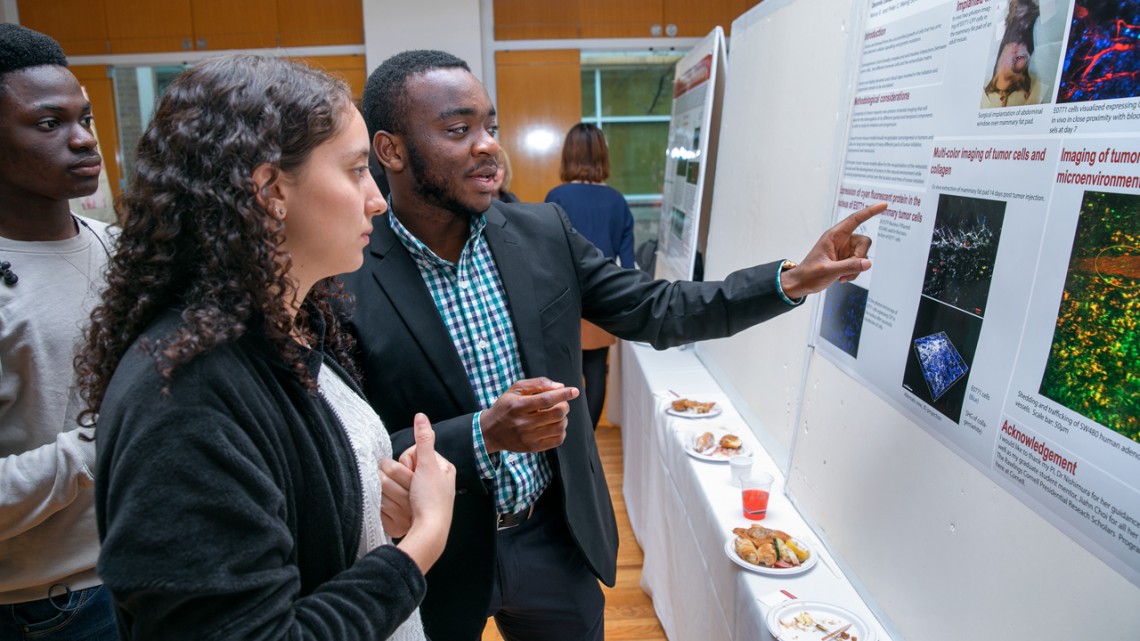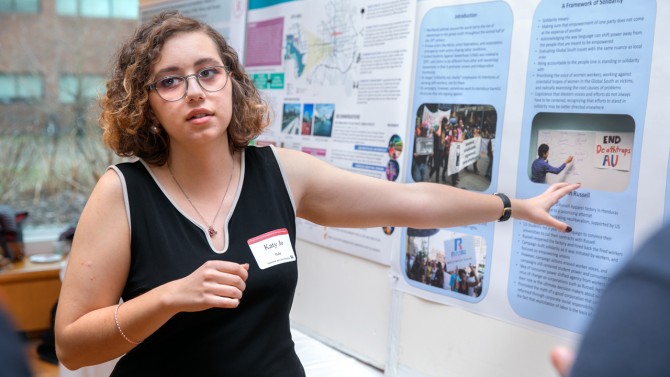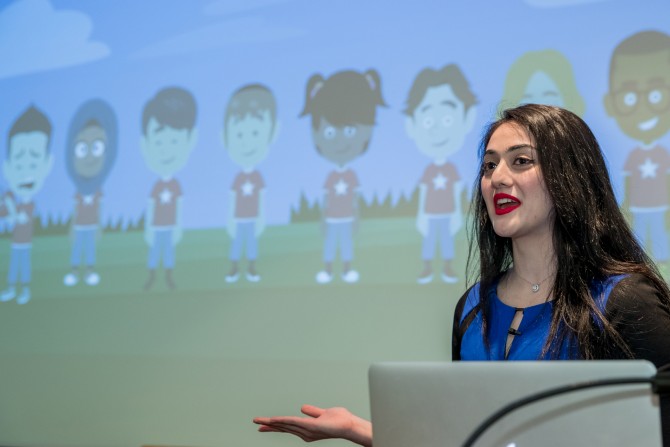
Dennis Delasi Nyanyo '18, a biology major in the College of Arts and Sciences, explains his research on cancerous tumors at the Rawlings scholars expo April 19.
Rawlings scholars share their undergraduate research
By Blaine Friedlander
From examining biological science to labor law to understanding obesity, about 50 undergraduate scholars shared results of their experiments, laboratory tests and analyses at the Hunter R. Rawlings III Research Scholars Senior Expo, April 19.
Skye Hart ’18, an urban and regional studies major in the College of Architecture, Art and Planning, looked at Seattle’s urban Native American community, a group that faces housing, health, education and employment disparities when compared with the general population.
“These issues should concern urban planners who strive to create equitable cities,” she said. In her poster, she proposed an approach to addressing urban inequities holistically rather than on a neighborhood-by-neighborhood basis.
The Rawlings scholars program provides significant support to students who have strong academic potential and intellectual curiosity. About 200 students are supported annually.
Severine Hex ’18, a college scholar in the College of Arts and Sciences, investigated the driving factors behind evolution, based on a complex linguistic system.
“It’s generally assumed that human language is unique and no other species’ communication systems could be called languages,” she said. Hex challenged this idea by looking at the complex linguistic system of the Zebra finch and saw that the ability to communicate effectively helped solidify the birds’ pair bond and resulted in greater reproductive success.
In her examination of the anti-sweatshop movement, where students stood in solidarity with garment workers worldwide about a decade ago, Katy Habr ’18, in the School of Industrial and Labor Relations, looked at the students’ goals in the context of garment supply chains. “While students have a strong rhetoric of solidarity, the campaigns largely emphasize student power – shifting the center of struggle from the point of production to the point of consumption.”
Across campus after the Rawlings event, undergraduates participating in the third annual CURBx – organized by Natasha Nanji ’19 and Alisha Nanji ’19 of the Cornell Undergraduate Research Board – welcomed new members of the Class of 2022 who were attending Cornell Days.
In his talk, Daniel Rosenfeld ’18 introduced the audience to the emerging trend called “flexitarianism” that bridges the rift between vegetarians and carnivores. About a quarter of the adults in the United States are flexitarians – a person who follows a mostly vegetarian diet and limits their meat intake, said Rosenfeld.
Zehra Jafri ’19, who studies early childhood cognition in human development, spoke on the effects of language on social stereotyping in young children, and Nima Leclerc ’19 told the audience about uncovering the materials world with computation.
Grant Fabrizio ’19 explained social behaviors in society filled with high-caloric foods, overeating and obesity, while Anant Hariharan ’18 (a physics and science of Earth systems major, in the College of Arts and Sciences, presented research earlier at the Rawlings Scholars expo) spoke on seismology and continental break-ups.
In her CURBx talk, Alyssa Holman ’18 told how modern science may one day reduce the amount of heart disease deaths in the United States. Problems presented by heart disease may be solved with bioprinting and tissue engineering through the creation of heart valves and artificial arteries, providing that we “may one day create full hearts,” she said.
Media Contact
Get Cornell news delivered right to your inbox.
Subscribe


